

Proto-Greek language. The Proto-Greek language is the assumed last common ancestor of all known varieties of Greek, including Mycenaean, the classical Greek dialects (Attic-Ionic, Aeolic, Doric and Arcado-Cypriot), and ultimately Koine, Byzantine and modern Greek.
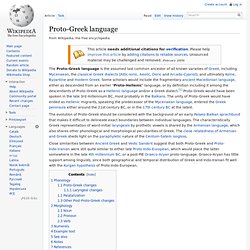
Hellenic languages. Mycenaean Greek. Mycenaean Greek is the most ancient attested form of the Greek language, spoken on the Greek mainland, Crete and Cyprus in the 16th to 12th centuries BC, before the hypothesised Dorian invasion which was often cited as the terminus post quem for the coming of the Greek language to Greece.
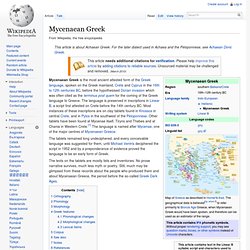
The language is preserved in inscriptions in Linear B, a script first attested on Crete before the 14th century BC. Most instances of these inscriptions are on clay tablets found in Knossos in central Crete, and in Pylos in the southwest of the Peloponnese. Other tablets have been found at Mycenae itself, Tiryns and Thebes and at Chania in Western Crete.[1] The language is named after Mycenae, one of the major centres of Mycenaean Greece. The tablets remained long undeciphered, and every conceivable language was suggested for them, until Michael Ventris deciphered the script in 1952 and by a preponderance of evidence proved the language to be an early form of Greek. Orthography[edit] Phonology[edit] Ancient Macedonian language.
Ancient Macedonian was the language of the ancient Macedonians.
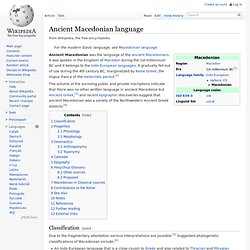
It was spoken in the kingdom of Macedon during the 1st millennium BC and it belongs to the Indo-European languages. It gradually fell out of use during the 4th century BC, marginalized by Koine Greek, the lingua franca of the Hellenistic period.[2] The volume of the surviving public and private inscriptions indicate that there was no other written language in ancient Macedonia but Ancient Greek,[3] and recent epigraphic discoveries suggest that ancient Macedonian was a variety of the Northwestern Ancient Greek dialects.[4] Classification[edit] Due to the fragmentary attestation various interpretations are possible.[5] Suggested phylogenetic classifications of Macedonian include:[6] Properties[edit] If γοτάν gotán ('pig') is related to *gwou ('cattle'), this would indicate that the labiovelars were either intact, or merged with the velars, unlike the usual Greek treatment (Attic βοῦς boûs). A. Phonology[edit] Morphology[edit] M.
Greek language. Greek (Modern Greek: ελληνικά [eliniˈka] "Greek" and ελληνική γλώσσα [eliniˈci ˈɣlosa] ( ) "Greek language") is an independent branch of the Indo-European family of languages.
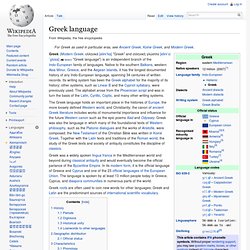
Native to the southern Balkans, western Asia Minor, Greece, and the Aegean Islands, it has the longest documented history of any Indo-European language, spanning 34 centuries of written records. Its writing system has been the Greek alphabet for the majority of its history; other systems, such as Linear B and the Cypriot syllabary, were previously used. Greek alphabet, pronunciation and language. Greek belongs to the Hellenic branch of the Indo-European language family, and is spoken by about 13 million people mainly in Greece and Cyprus, where it is an official language.
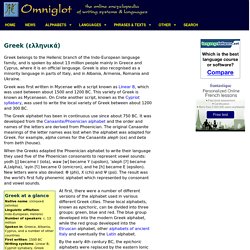
Greek is also recognised as a minority language in parts of Italy, and in Albania, Armenia, Romania and Ukraine. Greek was first written in Mycenae with a script known as Linear B, which was used between about 1500 and 1200 BC. Greek Alphabet. The letters in the Greek alphabet presented below are used for printed Ancient Greek texts.
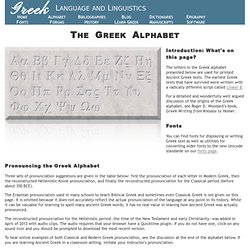
The earliest Greek texts that have survived were written with a radically different script called Linear B. For a detailed and wonderfully well argued discussion of the origins of the Greek alphabet, see Roger D. Woodard’s book, Greek Writing from Knossos to Homer. You can find fonts for displaying or writing Greek text as well as utilities for converting older fonts to the new Unicode standarde on our fonts page. List of Greek phrases. From Wikipedia, the free encyclopedia Αα[edit] (h)a ἀγεωμέτρητος μηδεὶς εἰσίτω Ageōmétrētos mēdeìs eisítō.
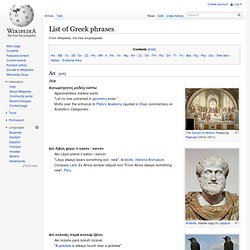
"Let no one untrained in geometry enter. " ἀεὶ Λιβύη φέρει τι κακόν / καινόν Aeì Libýē phérei ti kakón / kainón. "Libya always bears something evil / new", Aristotle, Historia Animalium. Compare Latin Ex Africa semper aliquid novi "From Africa always something new", Pliny. Ἀεὶ κολοιὸς παρὰ κολοιῷ ἱζάνει "Birds of a feather flock together" ἀεὶ κολοιὸς παρὰ κολοιῷ ἱζάνει Aeì koloiòs parà koloiôi hizánei.
"A jackdaw is always found near a jackdaw" Similar to English "birds of a feather flock together. " Papyrus, dated 75–125 A.D. describing one of the oldest diagrams of Euclid's Elements ἀεὶ ὁ θεὸς γεωμετρεῖ Aei ho theos geōmetreî. "God always geometrizes", Plato ἀεὶ ὁ θεὸς ὁ μέγας γεωμετρεῖ τὸ σύμπαν Aeì ho theòs ho mégas geōmetreî tò sýmpan. "Always the great God applies geometry to everything" ἀετοῦ γῆρας, κορυδοῦ νεότης Aetoû gêras, korydoû neótēs. "An eagle's old age (is worth) a sparrow's youth".